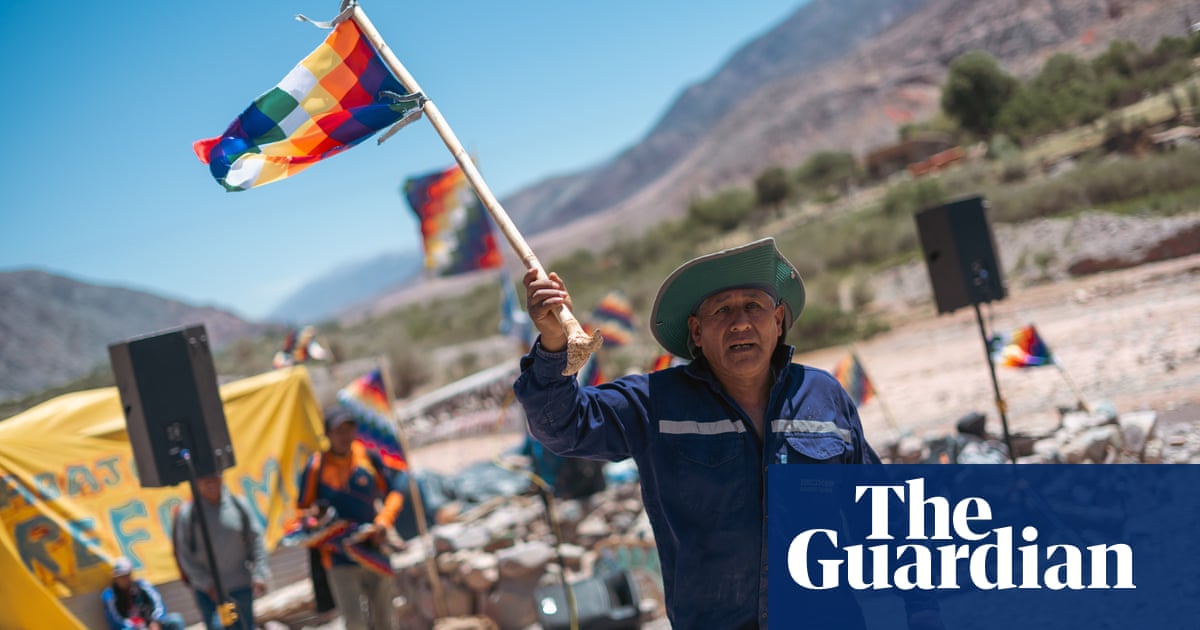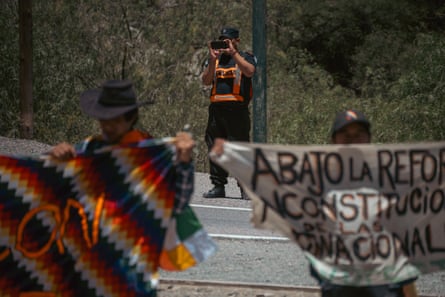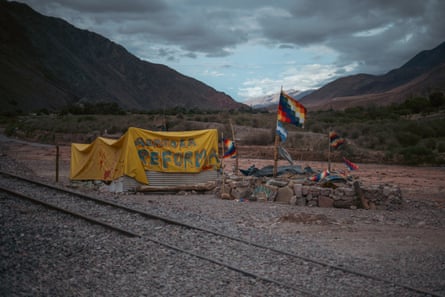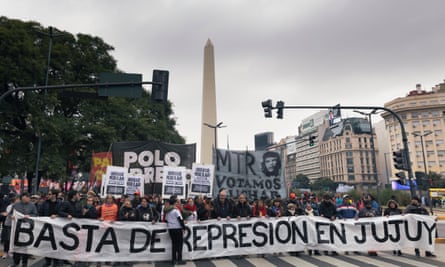
Blinded, sexually assaulted, silenced: the war over lithium, Argentina’s ‘white gold’
In the country’s ‘lithium triangle’ activists say Indigenous land protections have been removed and protests against mining violently repressed
Blinded, sexually assaulted, silenced: the war over lithium, Argentina’s ‘white gold’
In the country’s ‘lithium triangle’ activists say Indigenous land protections have been removed and protests against mining violently repressed

A man carries the Wiphala flag – which represents the native peoples of the Andes – at the protest camp in Purmamarca, Jujuy province. The demonstrators, many of them from the Indigenous community, are angry about changes made to the state constitution, and the growth of mining. Photograph: John Owens
Harriet Barber in Jujuy, Argentina
Thu 11 Jan 2024 07.00 EST
The first time, they came at 2am and without a warrant. Rosa* was alone. She was gagged, her eyes covered, and her hands bound with a cable tie.
“I was paralysed. I felt someone choking me,” Rosa recalls. “They called me a socialist, a whore. I was in my underwear; they touched me. One put his fingers inside of me.”

Rosa*, who says she was sexually assaulted by a police officer after attending a protest in Jujuy. Photograph: John Owens
It was the night after widespread protests against sweeping changes to the constitution in Jujuy, a northern Argentine province. The reforms were approved in the early hours behind closed doors, affecting two articles: one limiting the right to demonstrate and the other modifying the right to Indigenous lands, with the undeclared aim of facilitating lithium mining.
“The officers [two women and a man] told me not to protest any more,” says Rosa, a 42-year-old teacher and political activist. “When they left, they took the gag out and, one by one, kissed me on the lips. I stayed immobilised on the floor for 13 hours.”
Jujuy sits in the “lithium triangle”, a stretch of the Andes and salt flats of Argentina, Chile and Bolivia containing most of the world’s lithium reserves. Argentina holds the second-largest deposits of the metal in the world and has 38 mining projects planned in the north of the country, with three already operating. Its lithium exports grew by 235% in 2022, while the country’s new president, Javier Milei, has pledged to develop the sector.

Jujuy province, in north-west Argentina, is rich in resources, including lithium. Photograph: John Owens
The constitutional reforms passed in June 2023 without the informed consent of the public – according to human rights organisations – including its sizeable Indigenous population, a right enshrined in law since 2000. The amendments come amid increasing global demand for lithium, the “white gold” crucial for electric car batteries, laptops and mobile phones.
The Guardian collected testimonies from 22 people, reviewed video evidence, and interviewed human rights experts, lawyers and local journalists about alleged police repression in the weeks following the reforms – a threat which, according to activists, persists to this day.
Many accounts point to the provincial police using indiscriminate force against protesters and committing a campaign of intimidation and surveillance. Several people were blinded, some reportedly denied medical care, and others alleged that plainclothes officials assaulted demonstrators. Today, many report being watched.
Numerous Indigenous communities do not hold property titles to their lands in Jujuy but have the right to their ancestral territories under Argentina’s 1994 constitution. Humahuaca, a dusty, pastel-hued town sitting in a valley alongside traces of the Inca empire, is one of the domains where protests erupted on the night of 1 July.

Joel Paredes was at a protest in Humahuaca when he was hit by a rubber bullet, blinding him in one eye. Photograph: John Owens
Joel Paredes is a 28-year-old ceramist. His father owns land rich in minerals – such as iron oxide and copper oxide – and he was worried about the government’s “land grab”. “I wanted to fight for my rights, for the many losing their lands,” he says. At midnight, as people sang peacefully, the police began shouting and then shooting. “We had to run, but we became blocked,” he recalls.
Video footage from before the police actions shows families with banners and Argentine flags, with officers watching on in riot gear. “Mothers were screaming. I was all bloody. A rubber bullet hit my right eye and I felt as if I had a needle sticking to the back of my head. I knew then I was blind,” Paredes says.
At the hospital, medics protected him from police. “The police came asking for me by name. They wanted to keep us quiet,” he says.
We are afraid to go outside. The streets are empty. The children do not play
Lucía Apaza, community leader





